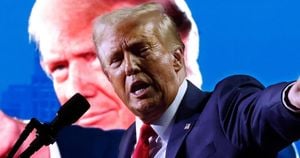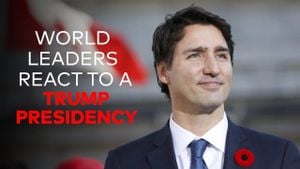Heightened tensions between Russia and the West have been marked by alarming rhetoric and military maneuvers, all triggered by the war in Ukraine. Recently, Russian President Vladimir Putin has escalated his threats, sending a clear message to the West: 'Back off.'
This stark warning came as Moscow launched missile strikes deep within Ukraine, reportedly involving hypersonic missiles capable of carrying nuclear warheads. The strikes hit key locations, including the Ukrainian city of Dnipro, and were interpreted by many as both retaliation and a formal declaration of intent against Western military support for Ukraine.
According to reports, Putin stated, "The actions taken by the West and Ukraine make it clear we must recalibrate our military strategy," highlighting the unprecedented risks posed by the war. Western military aid has emboldened Kyiv, allowing it to conduct long-range strikes deep inside Russian territory. The resulting escalation has raised the specter of broader European conflict, prompting concerns reminiscent of Cold War hostilities.
Putin's warning has not gone unnoticed. EU leaders are scrambling to respond to the realities of this new threat. Alarm bells ring louder each day, reminiscent of the fears experienced during the height of the Cold War. The European Union, long criticized for its lack of military readiness, now finds itself on high alert.
While many hope for de-escalation, fears of nuclear conflict are real, drawing attention to Putin's persistent undertones. Lawmakers and analysts are sounding warnings of potential nuclear retaliation should Western nations continue to increase their military presence or support Ukraine's offensive capabilities.
The Kremlin's heightened rhetoric coincides with accusations from various geopolitical analysts claiming the West has miscalculated its responses. U.S. President Joe Biden's slow initial military support for Ukraine is now seen as having overwhelmed the situation with arms, marking it as too little, too late. Critics argue this has emboldened both Ukraine and Russia to adopt more aggressive stances.
With NATO’s collective security under scrutiny, member nations are reconsidering their military expenditures and commitments. Germany has announced it will host NATO troops for combined military exercises, responding forcefully to Russia's hostile posturing. Sweden, Denmark, and Finland, long viewed as neutral actors, are now increasing military spending.
It’s not just Europe’s military readiness that's being tested; the Green Energy agenda is also under the microscope. Analysts speculate whether European nations can sustain their energy transitions amid increasing demands for military funds.
Meanwhile, Trump’s political resurgence introduces another unpredictable variable. Analysts are divided on whether his administration would prioritize U.S. military involvement or take steps toward withdrawing from NATO obligations—an outcome many fear might embolden aggressors like Putin.
Interestingly, former President Donald Trump has openly questioned the Biden administration's approach, citing mismanagement of international relations. Observers note his statements coming as military conflict rages, potentially swaying public opinion around national security.
Despite collective efforts, the situation remains precarious. A misstep from any side could spiral the current tensions out of control, leading to consequences far beyond regional conflict. Military analysts have cautioned about the return of Cold War mentality as both sides continue to flex their military muscles.
This raises questions about the future of military cooperation among Western allies, as they transition from peace talks to reevaluations of mutual defense strategies. Nations previously criticized for their pacifist policies are rethinking their military capabilities.
Putin’s actions act as both a warning and firebrand, compelling allies to unify or risk losing their standing on the global stage. Russia's missile threat commands attention as countries make responses aimed at fortifying alliances and military capabilities.
While many remain hopeful for diplomatic negotiations, the reality of military escalations demands urgent attention across the board. The world watches as tensions mount, praying for restraint amid the rhetoric of war.
With the delicate balance of power and the ever-present threat of change, the stakes have never been higher. Global leaders must tread carefully as history often reflects how small miscalculations can lead to major conflicts.
Putin’s missile message resonates ominously, urging nations to prioritize awareness, preparedness, and unity against aggression. The fragile peace so often taken for granted may hinge on the decisions made today, as they navigate through this unsettled period of geopolitical uncertainty.



